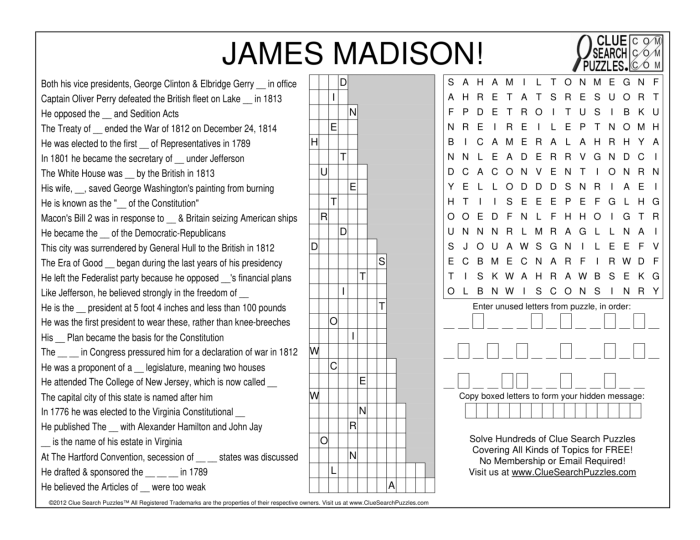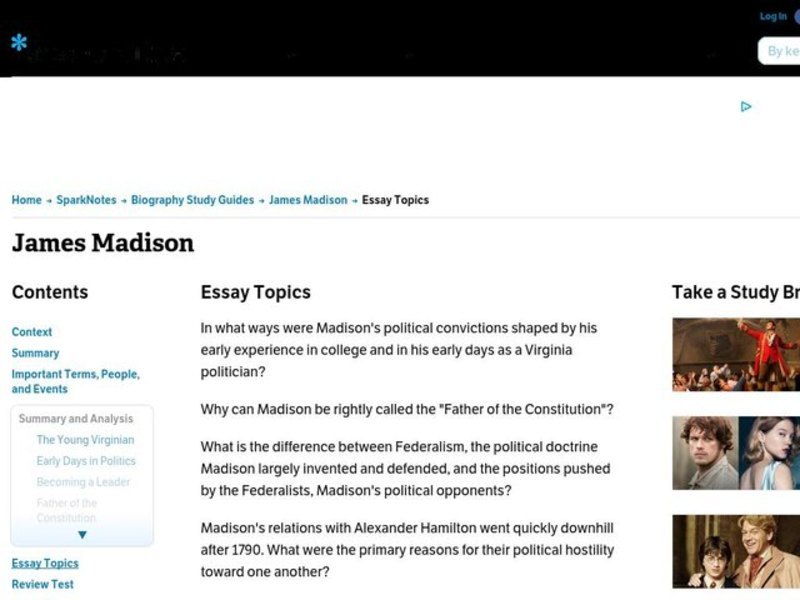Unveiling the secrets of the United States Constitution, the James Madison iCivics Answer Key provides a comprehensive guide to understanding the foundational document of American government. This key unlocks the wisdom of James Madison, the “Father of the Constitution,” offering insights into his vision for a balanced and enduring republic.
Through a journey of historical exploration, we will delve into Madison’s contributions to the Constitutional Convention, his innovative ideas on federalism and separation of powers, and his lasting impact on American political thought and institutions.
James Madison’s Role in the Constitutional Convention: James Madison Icivics Answer Key

James Madison, known as the “Father of the Constitution,” played a pivotal role in the Constitutional Convention of 1787. His profound understanding of political theory, his meticulous attention to detail, and his persuasive oratory skills left an indelible mark on the drafting and ratification of the United States Constitution.
Contributions to the Drafting of the Constitution
- Virginia Plan:Madison presented the Virginia Plan, which Artikeld a framework for a new federal government with three branches, checks and balances, and a strong central authority.
- Bill of Rights:Madison was instrumental in drafting the Bill of Rights, which guaranteed individual freedoms and limited the powers of the federal government.
- Federalist Papers:Along with Alexander Hamilton and John Jay, Madison wrote the Federalist Papers, a series of essays that explained and defended the proposed Constitution to the public.
Influence on the Final Document
Madison’s ideas and proposals had a profound influence on the final document:
- Structure of Government:The three-branch structure and the system of checks and balances that Madison advocated for became the foundation of the new government.
- Individual Rights:The Bill of Rights, which Madison championed, ensured that the Constitution protected the fundamental freedoms of citizens.
- Ratification:Madison’s persuasive arguments and his role in the Federalist Papers helped convince the states to ratify the Constitution.
Madison’s Vision for the Constitution
James Madison’s vision for the Constitution was to create a strong and stable government that would protect the rights of individuals and states. He believed that the best way to achieve this was through a system of checks and balances, in which different branches of government would have the power to limit each other’s actions.
Madison’s ideas on federalism, separation of powers, and checks and balances were heavily influenced by his study of ancient and modern political systems. He believed that the best way to prevent tyranny was to divide power among different branches of government and levels of government.
Federalism
Madison believed that a federal system of government was the best way to balance the powers of the national government and the states. In a federal system, power is divided between the national government and the states, with each level of government having its own powers and responsibilities.
- The national government is responsible for matters that affect the entire country, such as foreign affairs, defense, and interstate commerce.
- The states are responsible for matters that affect their own citizens, such as education, law enforcement, and public health.
Separation of Powers
Madison also believed that the best way to prevent tyranny was to separate the powers of government into different branches. In a system of separation of powers, each branch of government has its own powers and responsibilities, and no one branch can exercise all of the powers of government.
- The legislative branch is responsible for making laws.
- The executive branch is responsible for enforcing laws.
- The judicial branch is responsible for interpreting laws.
Checks and Balances
Madison believed that the best way to ensure that no one branch of government becomes too powerful was to create a system of checks and balances. In a system of checks and balances, each branch of government has the power to limit the actions of the other branches.
- The legislative branch can pass laws, but the executive branch can veto them.
- The executive branch can veto laws, but the legislative branch can override the veto with a two-thirds vote.
- The judicial branch can declare laws unconstitutional, but the legislative branch can impeach and remove judges from office.
Madison’s ideas on federalism, separation of powers, and checks and balances were incorporated into the Constitution, and they have helped to create a strong and stable government that has protected the rights of individuals and states for over 200 years.
Madison’s Impact on American Government

James Madison’s influence on the American government is immeasurable. As the primary architect of the Constitution, he played a pivotal role in shaping the structure and principles of the United States.
Madison’s vision for a strong central government, balanced by a system of checks and balances, has served as the foundation of American democracy for over two centuries. His ideas on federalism, separation of powers, and individual rights have had a profound impact on the development of the American political system.
Madison as the “Father of the Constitution”
Madison’s role in the Constitutional Convention cannot be overstated. He was the driving force behind the creation of the Constitution, and his ideas were instrumental in shaping the final document.
- He proposed the Virginia Plan, which Artikeld the basic structure of the federal government.
- He played a key role in the drafting of the Bill of Rights, which guarantees individual liberties.
- He was a leading advocate for the ratification of the Constitution, and he wrote the Federalist Papers, which helped to explain and promote the new government.
Madison’s Legacy as an Influential Figure
Madison’s legacy as one of the most influential figures in American history is secure. His ideas have shaped the American government and society in countless ways.
- He is considered one of the most important Founding Fathers.
- His writings on politics and government continue to be studied and debated today.
- His ideas have inspired generations of Americans to fight for democracy and freedom.
Madison’s Writings and Political Thought

James Madison was a prolific writer and political theorist who made significant contributions to American political thought. His writings and ideas shaped the development of the United States Constitution and influenced the course of American government for centuries.
Contributions to Political Theory
Madison’s most significant contribution to political theory was his articulation of the concept of “factions.” He argued that factions, or groups of people with shared interests, are an inevitable part of human society. However, he also believed that factions could be dangerous to republican government because they could lead to tyranny of the majority or the minority.
To address the problem of factions, Madison proposed a system of checks and balances in which different branches of government would be able to check the power of each other. He also argued for a large republic, in which the number of factions would be so great that no single faction would be able to dominate the government.
Ideas on Democracy, Republicanism, and Individual Rights
Madison was a strong advocate for democracy and republicanism. He believed that the people should have a voice in their government and that the government should be accountable to the people. He also believed that individual rights should be protected from government encroachment.
Madison’s ideas on democracy, republicanism, and individual rights were instrumental in the development of the United States Constitution. The Constitution established a system of government that is based on the principles of popular sovereignty, limited government, and the protection of individual rights.
Madison’s Relationship with Other Founders
James Madison’s interactions with other Founders played a pivotal role in shaping the development of the Constitution. His relationships with George Washington, Thomas Jefferson, and Alexander Hamilton were particularly influential.
George Washington
Madison and Washington shared a close and respectful relationship. Washington admired Madison’s intellect and diplomatic skills, and he frequently sought his advice on matters of state. Madison, in turn, held Washington in high regard and considered him an indispensable figure in the nation’s founding.
Thomas Jefferson
Madison and Jefferson were close friends and political allies. They shared a common commitment to republicanism and limited government. Their collaboration on the Declaration of Independence and the Constitution was instrumental in shaping the principles and structure of the new nation.
Alexander Hamilton
Madison’s relationship with Hamilton was more complex and adversarial. While they agreed on some fundamental principles, they differed sharply on the role of the federal government. Madison favored a strong state governments and a limited central authority, while Hamilton advocated for a more powerful national government.
Despite their differences, Madison and Hamilton worked together to ensure the ratification of the Constitution. Their debates and compromises helped to refine and strengthen the document, and their contributions laid the foundation for the American system of government.
Madison’s Contributions to the Bill of Rights

James Madison played a pivotal role in the drafting and ratification of the Bill of Rights, the first ten amendments to the United States Constitution. His contributions to the Bill of Rights had a profound impact on American law and society, enshrining fundamental rights and freedoms that continue to shape the nation today.
Madison’s Role in Drafting the Bill of Rights
As a member of the First Congress, Madison was instrumental in drafting the Bill of Rights. He drew upon his extensive knowledge of history and political philosophy, as well as his experience in the Constitutional Convention, to craft amendments that would protect individual liberties from government encroachment.
Key Provisions of the Bill of Rights, James madison icivics answer key
- First Amendment:Freedom of religion, speech, press, assembly, and petition.
- Second Amendment:Right to bear arms.
- Third Amendment:Protection against quartering of soldiers.
- Fourth Amendment:Protection against unreasonable searches and seizures.
- Fifth Amendment:Due process of law, protection against double jeopardy, and right against self-incrimination.
- Sixth Amendment:Right to a fair trial, including the right to an attorney.
- Seventh Amendment:Right to a jury trial in civil cases.
- Eighth Amendment:Prohibition of excessive bail, fines, and cruel and unusual punishment.
- Ninth Amendment:Reservation of rights not enumerated in the Constitution.
- Tenth Amendment:Powers not delegated to the federal government are reserved to the states or the people.
Impact of the Bill of Rights
The Bill of Rights has had a profound impact on American law and society. It has served as a bulwark against government overreach, protecting the rights of individuals from arbitrary or oppressive actions. The Bill of Rights has also played a central role in shaping American legal doctrine, providing the basis for countless Supreme Court decisions that have further defined and expanded individual rights.
Madison’s Presidency
Madison’s presidency spanned from 1809 to 1817. His tenure was marked by the War of 1812, which he initially opposed but eventually led the country through. Despite the challenges, he managed to preserve the young nation’s independence and strengthen its institutions.
Policies and Accomplishments
Madison’s domestic policies focused on economic development and national unity. He established the Second Bank of the United States to stabilize the financial system and promote economic growth. He also signed the Tariff of 1816, which protected American industries from foreign competition.
In terms of foreign policy, Madison sought to maintain neutrality amidst the Napoleonic Wars, but the impressment of American sailors by the British led to the outbreak of the War of 1812.
War of 1812
The War of 1812 was a significant challenge for Madison’s presidency. The British initially had the upper hand, capturing Washington, D.C., and burning the White House. However, American victories at the Battle of New Orleans and the Battle of Lake Champlain boosted morale and ultimately led to a stalemate.
The war ended with the Treaty of Ghent in 1814, which restored peace and maintained American independence.
Madison’s Legacy
James Madison’s legacy as the “Father of the Constitution” endures as his most significant contribution to American history. His ideas and writings profoundly shaped the nation’s political and legal framework, establishing a system of government that has served as a model for democracies worldwide.
Madison’s vision for a limited government, with power divided among branches, has proven resilient, safeguarding individual liberties while ensuring effective governance. His advocacy for a Bill of Rights, guaranteeing fundamental freedoms, remains a cornerstone of American jurisprudence.
Impact on American History and Government
- Designed the framework for the federal government, establishing the three branches of power and a system of checks and balances.
- Authored the Federalist Papers, which played a pivotal role in the ratification of the Constitution.
- Served as the fourth President of the United States, guiding the nation through the War of 1812.
Enduring Influence on American Political Thought and Institutions
- His theory of factions and the need for a large republic continues to inform debates on political stability and the role of interest groups.
- His emphasis on individual rights and limited government remains a touchstone for American political discourse.
- His ideas have influenced the development of constitutional law and the interpretation of the Constitution by the Supreme Court.
Questions and Answers
What was James Madison’s primary role in the Constitutional Convention?
Madison was the primary author of the Virginia Plan, which became the basis for the Constitution, and played a leading role in drafting and debating the final document.
What were Madison’s key ideas on federalism?
Madison believed in a system where power is divided between the federal government and state governments, with each level having its own powers and responsibilities.
How did Madison’s vision for the Constitution influence the structure of American government?
Madison’s ideas on federalism, separation of powers, and checks and balances shaped the three branches of government (executive, legislative, and judicial) and the system of checks and balances that prevents any one branch from becoming too powerful.